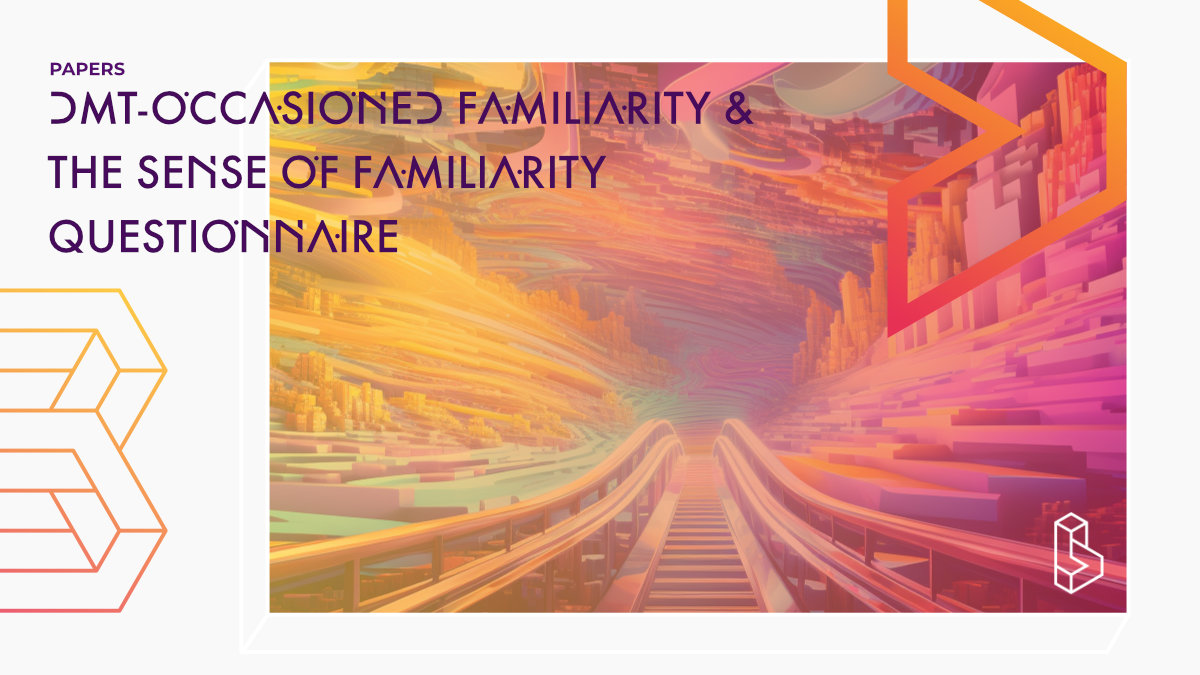This survey study (n=227) examined respondents’ sense of familiarity after inhaling DMT. The researchers also developed the Sense of Familiarity Questionnaire (SOF-Q) which categorised the sense of familiarity into five themes, with further analysis identifying two classes of participants (entity encounters familiarity, feeling & emotion or knowledge gained familiarity).
Abstract of DMT-Occasioned Familiarity and the Sense of Familiarity Questionnaire
“This study investigated the sense of familiarity attributed to N, N-dimethyltryptamine (DMT) experiences. 227 naturalistic inhaled-DMT experiences reporting a sense of familiarity were included. No experiences referenced a previous DMT or psychedelic experience as the source of the familiarity. A high prevalence of concomitant features discordant from ordinary consciousness were identified: features of a mystical experience (97.4%), ego-dissolution (16.3%), and a “profound experience of death” (11.0%). The Sense of Familiarity Questionnaire (SOF-Q) was developed assessing 19 features of familiarity across 5 themes: (1) Familiarity with the Feeling, Emotion, or Knowledge Gained; (2) Familiarity with the Place, Space, State, or Environment; (3) Familiarity with the Act of Going Through the Experience; (4) Familiarity with Transcendent Features; and (5) Familiarity Imparted by an Entity Encounter. Bayesian latent class modeling yielded two stable classes of participants who shared similar SOF-Q responses. Class 1 participants responded, “yes” more often for items within “Familiarity Imparted by an Entity Encounter” and “Familiarity with the Feeling, Emotion, or Knowledge Gained.” Results catalogued features of the sense of familiarity imparted by DMT, which appears to be non-referential to a previous psychedelic experience. Findings provide insights into the unique and enigmatic familiarity reported during DMT experiences and offer a foundation for further exploration into this intriguing phenomenon.”
Authors: David W. Lawrence, Alex P. DiBattista & Christopher Timmermann
Summary of DMT-Occasioned Familiarity and the Sense of Familiarity Questionnaire
DMT-induced phenomenological and subjective experience has been enhanced by efforts to characterize the psychoactive effects of DMT. The experience following the consumption of ayahuasca, a brew enabling an orally active form of DMT, has been catalogued in many studies. The experience has been exalted for its profundity, and survey-based studies suggest the effects of DMT may enduringly impact beliefs concerning the nature of reality.
Most DMT-related research has focused on the effect of exogenous DMT, but the presence of endogenous DMT in human and mammalian organisms has been established. The role of endogenous DMT has yet to be fully elucidated.
Critically interrogating exogenous DMT’s subjective and phenomenological effects may help elucidate a potential analogous endogenous role. For example, similarities have been identified between aspects of the DMT experience and naturalistic non-drug-induced states.
Find this paper
https://doi.org/10.1080/02791072.2023.2230568
Paywall | Google Scholar | Backup | 🕊
Cite this paper (APA)
Lawrence, D. W., DiBattista, A. P., & Timmermann, C. (2023). N, N-Dimethyltryptamine (DMT)-Occasioned Familiarity and the Sense of Familiarity Questionnaire (SOF-Q). Journal of Psychoactive Drugs. https://doi.org/10.1080/02791072.2023.2230568
Authors
Authors associated with this publication with profiles on Blossom
Chris TimmermannChris Timmerman is a postdoc at Imperial College London. His research is mostly focussed on DMT.

